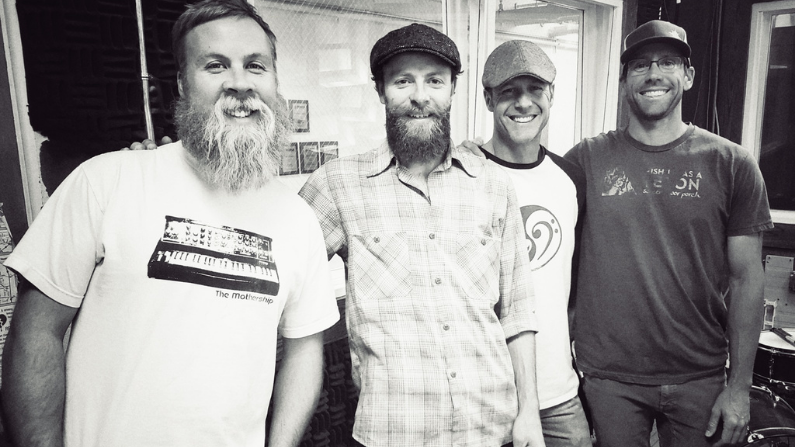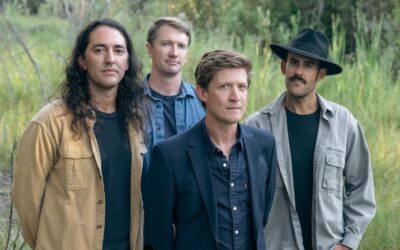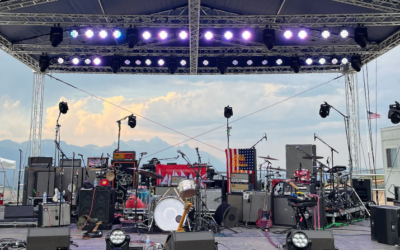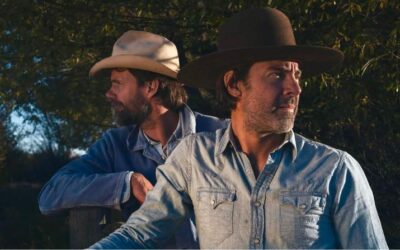Aaron Davis is a multi-instrumentalist, vocalist, and producer/engineer who is inextricably linked to the burgeoning local Jackson music scene. Davis has an eclectic solo project called Aaron Davis & the Mystery Machine, performs as half of the longtime alt-folk-rock band Screen Door Porch, and he is also the studio engineer/producer/session player at his own Three Hearted Recording Studio down in Hoback, Wyoming.
Davis’ latest solo EP, “Catalyst,” reflects on an indigenous community’s plea for decency, the vast importance of hugs, the loved ones of fallen local heroes and the initial shock of the pandemic.
In advance of some upcoming gigs including at the Treefort Music Festival in Boise, Idaho, in late September, Aaron Davis joined us recently in the KHOL studio.
Listen above for more and check out a transcript of the interview below.
KnewJack: You’ve been a longstanding member of and, in many ways, an ambassador of the local music community here in Jackson. In fact, this new EP is your 10th release across multiple projects. If we can rewind to the beginning, how did you get your start in music?
Aaron Davis: Well, I guess you’d say I have a fairly musical family. My grandfather fronted a country band for 50 years. As a kid, I remember my first favorite songs came off of a 1950s gas station cassette tape with oldies and whatnot. My dad also picked around the house and would play John Prine. And so I picked up his guitar, which was, oh my gosh, it was so hard to play, and picked out a couple of riffs from the Nirvana Unplugged album that I was way into. As soon as you put together a couple notes and make a melody, to me, that was like breaking through a wall that I hadn’t really experienced before. So, I really chased that for four or five, six hours a day in college and just kept chasing it.
KnewJack: Let’s fast forward to today. Can you tell us about the concept of your EP “Catalist” and how it came to be?
Aaron Davis: So, I had a couple songs that I’d written and I’d planned to record with the Mystery Machine. And then I lucked up with this fellowship through the National Endowment for the Arts. And that sort of pushed me to get to recording it, but also to write a little bit more for it. So at that point, I had a batch of about 10 [songs] that I’d written and I peeled that back to four that really kind of fit together as what I consider a pandemic project for sure. I think all those songs fit together as kind of pandemic writing.
KnewJack: So, as I mentioned in my intro, you cover a lot of different themes in the four songs. Can you walk us through the EP track by track?
Aaron Davis: The first track, which is also the first single. It’s called “(You Bet) The Catalyst Blues.” I had heard an interview on the radio with an indigenous Wyoming family that was basically pleading for decency. I think they were trying to get some help but also the Northern Arapaho tribal members of the Wind River Indian Reservation had reportedly been denied treatment at a local hospital in the state. I just couldn’t believe that that would happen in [the] modern day. You know, it’s interesting how songs come together because I had a flood of emotion from hearing that. And then at the same time, I ordered this old time banjo clawhammer book. And I’ve never been a traditional banjo player. It’s kind of really a hybrid mix of finger-style guitar and some old time clawhammer. So, I was really concentrating on this song, “BlackBerry Blossom,” an old traditional tune but really wasn’t nailing it, which is kind of the story of my songwriting career. Maybe I’ll dip into these traditions and try to learn something, but never could quite nail it as a traditionalist. But as a songwriter, you kind of get on these riffs and you start to experiment and all of a sudden you have something that’s new and fresh but it came from this source. And so I was playing that riff from “BlackBerry Blossom” and then the words, direct words, from this Wyoming indigenous family, I was jotting down and then added some of my own words. And that’s how that came together.
“Hug it Out.” That tune I wrote for my wife, Sedar Rose. It’s really about just transitioning in life because we all go through these different phases in our life and they all thread together in these relationships that you’re in. And through close friends and family members and Sedar it’s kind of this long haul decision you make when you love people. And so there’s just a circular thing that happens that’s just awesome. And that’s what that that song is about. Ultimately, it’s just a slow burn love song.
The next song is “The Great Ones,” and this song came together really quickly, which doesn’t always happen for me. But this one certainly came from the passing of a couple of local community members. Travis Ziehl and a local musician, Candice Miller, and Travis’s widow had started this blog after he passed away from brain surgery. That was just totally inspiring and heartbreaking, all in the same coin, really. And I already had the music kind of sitting there and started writing the words and the melody came together pretty quickly. And basically, as the name implies, “The Great Ones,” just a couple of great people that fell under different terms, but sad nonetheless.
Let’s see the last song is called “Weather,” and this is the only time I’ve ever done this for a record or ever released anything in this way. It was on March 13, 2020, when I basically realized my whole schedule got wiped out of gigs and really started to question whether I was going to continue doing live music as an artist. Questioned all kinds of things. Crazy weekend for everybody and the following weeks as well. But, you know, when a song or when inspiration hits, I certainly learned to just listen to it and write it out as long as you can. That song I wrote in an hour, and then I decided to set up a session and I recorded it. [It] took me about four hours between writing it and recording it. And that’s what made it to the album. It’s just a live take of it. I’d like to do more of that. There’s some songs on here that I spent probably too much time on, you know, having the luxury of having my own recording space. You know, I do love to experiment in the studio, but at the same time, I think that this idea of writing and putting out music quicker is something I’d like to do with my next project.
KnewJack: Trying to capture lightning in a bottle, which seems successful for that. And just an instant reaction to so much going on.
Aaron Davis: Totally. And I’ve talked to other people about this, too. As you hold onto these songs that you’ve been working on or recorded, you know, you get tired of them and by the time it comes out, you’re kind of over it a little bit. So, I’d love to be able to put out things that I’m excited about, like the moment that I wrote it, you know, [and] kind of be able to continue that energy with it a little more.





